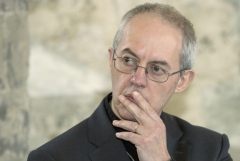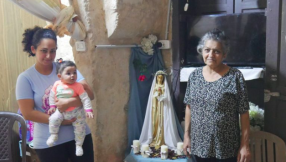
Many older people have a desperate fear of becoming reliant on others. To end up requiring help from others, becoming dependent like a child, seems abhorrent and shameful. Surely suicide would be preferable.
Yet the historic biblical faith teaches us that in reality we are designed to be dependent. In the second chapter of Genesis human beings are created out of the dust of the ground. 'Adam', the Hebrew for 'mankind', is derived from 'adamah', the ground. And in English the word 'human' is derived from 'humus' (the compost heap, not the Greek dip you put on pitta bread!)
So God choses to make us out of dust, out of the same stuff as everything else. And therefore we are designed to share the weakness, vulnerability and dependence of the rest of the physical creation. Presumably God could have chosen to make us differently. He could have made us strong, resilient and powerful, perhaps like the glorious cherubim and seraphim that worship before his throne. But instead in his sovereign wisdom he chose to make us weak, fragile and vulnerable.
So dependence is not an alien, subhuman and shameful condition. It is part of the narrative of every human life. You came into this world utterly and totally dependent on the love and care of others – you could do nothing for yourself and you wouldn't have survived unless somebody cared for you, loved you and fed you. Then as adults we go through a phase of life when other people depend on us. But as we near the end of our earthly existence most of us will again become dependent on the love and care of others.
I learnt this in a vivid way from the experience of caring for my mother, Grace. She was a lovely, vivacious person of deep compassion and Christian vision, but then she was struck down by a progressive form of neurological illness. Near the end I was visiting her and someone thrust a yoghurt pot and a teaspoon in my hand. I found myself trying to feed her. And I remember at the time thinking, "This is the way it was meant to be". I was learning more of what it meant to be a son and she was learning more of what it meant to be a mother. Because dependence is part of the human story.
I sometimes hear old people, including Christian old people who should know better, say something like "I just don't want to be a burden to anybody. I'm happy to care for other people, but I don't want to be looked after. I'd rather go to heaven than end up being looked after."

If you ever hear someone say that, you must immediately say, "You are wrong! – you are designed to be a burden. I am designed to be a burden to you and you are designed to be a burden to me."
To be a human being is to be called to share the burdens of the life which God has given us. This is why the Apostle Paul says, "Bear one another's burdens and you will fulfil the law of Christ."
But the Christian faith teaches us something even more wonderful and amazing. Because God himself, the supreme Creator and Ruler of the cosmos, chooses to become a pathetic, vulnerable and totally dependent newborn baby. We are so familiar with the doctrine of the incarnation that we have lost its scandalous force. God makes himself an infant who can do absolutely nothing for himself, a fragile and wonderful being who depends on human breasts for milk and human hands to wipe his bottom. He is totally dependent on the love and care of others. And how does his earthly life come to a close? With arms and legs stretched on a cross; and from his parched lips comes the words, "I am thirsty..."
God chooses to make himself vulnerable and dependent. And yet even at these times of total dependence the Christian faith teaches us that he was still the Second Person of the Trinity, upholding the universe by the word of his power. His divine status and dignity is in no way touched by his dependence. Please remember this if you find yourself in a place of total dependence and you have to rely on others to feed you and care for you and wash you. To depend on others in no way damages, changes or demeans your unique value, status and dignity as a precious child of the Most High.
If dependence is good enough for Jesus then it's good enough for us. Jesus shares the created fragility of our humanity, and the narrative of a human life. In fact there is nothing that we can go through in the painful experiences of human life, including the experiences of dying, in which in some sense Jesus has not gone before us. As Gilbert Meilaender puts it: "He was with us in the darkness of the womb as he will be with us in the darkness of the tomb."
Professor John Wyatt is a leading expert on end of life issues and a former chair of the medical study group of the Christian Medical Fellowship (CMF). He is the author of a new study guide on death and dying called Finishing Line.

















